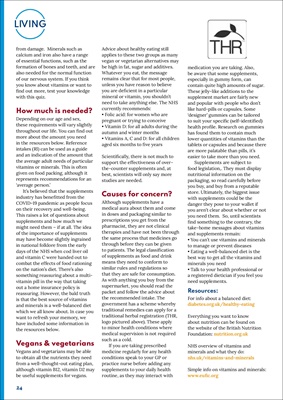
24
LIVING
role in DNA synthesis, and acting
as antioxidants to protect our cells
from damage. Minerals such as
calcium and iron also have a range
of essential functions, such as the
formation of bones and teeth, and are
also needed for the normal function
of our nervous system. If you think
you know about vitamins or want to
find out more, test your knowledge
with this quiz.
How much is needed?
Depending on our age and sex,
these requirements will vary slightly
throughout our life. You can find out
more about the amount you need
in the resources below. Reference
intakes (RI) can be used as a guide
and an indication of the amount that
the average adult needs of particular
vitamins or minerals. This is often
given on food packing, although it
represents recommendations for an
'average person.'
It's believed that the supplements
industry has benefitted from the
COVID-19 pandemic as people focus
on their recovery and well-being.
This raises a lot of questions about
supplements and how much we
might need them - if at all. The idea
of the importance of supplements
may have become slightly ingrained
in national folklore from the early
days of the NHS when cod liver oil
and vitamin C were handed out to
combat the effects of food rationing
on the nation's diet. There's also
something reassuring about a multivitamin
pill in the way that taking
out a home insurance policy is
reassuring. However, the bald truth
is that the best source of vitamins
and minerals is a well-balanced diet
which we all know about. In case you
want to refresh your memory, we
have included some information in
the resources below.
Vegans & vegetarians
Vegans and vegetarians may be able
to obtain all the nutrients they need
from a well-thought-out eating plan,
although vitamin B12, vitamin D2 may
be useful supplements for vegans.
Advice about healthy eating still
applies to these two groups as many
vegan or vegetarian alternatives may
be high in fat, sugar and additives.
Whatever you eat, the message
remains clear that for most people,
unless you have reason to believe you
are deficient in a particular mineral
or vitamin, you shouldn't need to take
anything else. The NHS currently
recommends:
• Folic acid: for women who are
pregnant or trying to conceive
• Vitamin D: for all adults during
the autumn and winter months
• Vitamins A, C and D: for all
children aged 6 months to 5 years
Scientifically, there is not much to
support the effectiveness of overthe-counter
supplements and, at
best, scientists will only say more
studies are needed.
Causes for concern?
Although supplements have a
medical aura about them and come
in doses and packaging similar to
prescriptions you get from the
pharmacist, they are not clinical
therapies and have not been through
the same process that medicines go
through before they can be given to
patients. The legal classification of
supplements as food and drink means
they need to conform to similar rules
and regulations so that they are safe
for consumption. As with anything
you buy from the supermarket, you
should read the packet and follow
the advice about the recommended
intake. The government has a scheme
whereby traditional remedies
can apply for a traditional herbal
registration (THR). These apply
to minor health conditions where
medical supervision is not required
such as a cold.
If you are taking prescribed
medicine regularly for any health
conditions speak to your GP or
practice nurse before adding any
supplements to your daily health
routine, as they may interact with
medication you are taking. Also,
be aware that some supplements,
especially in gummy form, can
contain quite high amounts of sugar.
These jelly-like additions to the
supplement market are fairly new
and popular with people who don't
like hard-pills or capsules. Some
'designer' gummies can be tailored
to suit your specific (self-identified)
health profile. Research on gummies
has found them to contain much
lower quantities of vitamins than the
tablets or capsules and because there
are more palatable than pills, it's
easier to take too many.
As supplements are subject to
food legislation, they must display
nutritional information on the
packaging so read carefully before
you buy, and buy from a reputable
store. Ultimately, the biggest issue
with supplements could be the
danger they pose to your wallet if
you aren't clear about whether or not
you need them. So, until scientists
find something to the contrary, the
take-home messages about vitamins
and supplements remain:
• You can't use vitamins and
minerals to manage or prevent
diseases
• Eating a well-balanced diet is
the best way to get all the vitamins
and minerals you need
• Talk to your health professional
or a registered dietician if you feel
you need supplements.
Resources:
For info about a balanced diet:
diabetes.org.uk/healthy-eating
Everything you want to know
about nutrition can be found on
the website of the British Nutrition
Foundation: nutrition.org.uk
NHS overview of vitamins and
minerals and what they do:
nhs.uk/vitamins-and-minerals
Simple info on vitamins and
minerals:
www.eufic.org